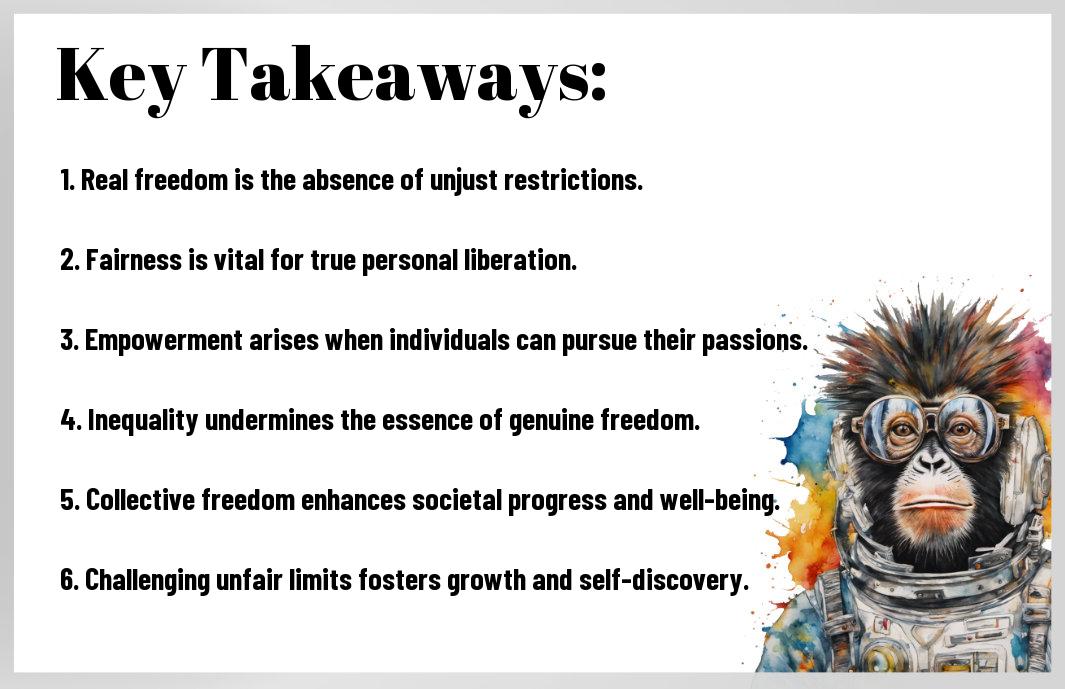
Newsletter Subscribe
Enter your email address below and subscribe to our newsletter

Enter your email address below and subscribe to our newsletter

It’s imperative to understand that real freedom means living without unfair limits imposed by society or government. I believe that true liberation allows you to express your beliefs, pursue your passions, and make choices without fear of oppression. However, many individuals around the world still face significant restrictions. To comprehend the varying degrees of freedom, I encourage you to explore the Countries and Territories rankings. By doing so, you gain insight into the freedoms you may take for granted daily.

As I probe the concept of real freedom, it becomes clear that it encompasses more than just the absence of restrictions. It is about living authentically, making choices without fearing repercussions, and embracing the power to shape your own destiny. Real freedom means breaking away from conventions that do not serve your aspirations and asserting your right to pursue a fulfilling life without unfair limits.
Around the world, history reveals a myriad of struggles for freedom, each reflecting a unique fight against oppression. From the abolitionist movements to the civil rights strides, people have continually sought liberation from societal constraints. These historical battles highlight how the quest for freedom is often tied to the fight for basic human rights and justice, emphasizing that the journey toward true liberation has deep roots in our past.
The exploration of freedom in today’s context emphasizes personal autonomy and social equity. The focus has shifted towards recognizing how systemic inequalities can impose unfair limits on individuals. We now understand that real freedom involves not only the absence of interference but also the presence of opportunities for everyone, regardless of their backgrounds. This awareness challenges us to address the disparities that hinder genuine liberty.
Hence, it is necessary to grasp that in our modern society, freedom must also encompass respect for diversity and the empowerment of all individuals. Real freedom isn’t merely about individual rights; it requires us to be vigilant against systemic injustices that limit one’s potential. As we define freedom today, we must strive to create an environment where everyone can thrive without the weight of societal limitations. Ultimately, understanding modern freedom involves recognizing it as a shared experience that promotes equity and respect for all.
It is imperative to recognize that unfair limits can manifest in various forms, hindering our freedom and potential. These limits often originate from societal expectations, cultural norms, and systemic issues that dictate what we can or cannot achieve. Understanding these constraints allows us to question their validity and seek ways to overcome them, ultimately leading us toward a more liberated existence.
Along my journey, I have encountered numerous social constraints that aim to dictate how I should live my life. These constraints stem from cultural standards, traditional roles, and societal expectations that can stifle individuality and personal growth. Challenging these norms is pivotal to ensuring that we can express ourselves authentically and pursue our true desires.
After observing the economic landscape, I have come to realize that many individuals face significant barriers that limit their freedom. These barriers often include income inequality, limited access to education, and inadequate job opportunities, all of which can create a cycle of disadvantage that is difficult to escape. Recognizing these economic hurdles is vital for advocating for change that enables everyone to thrive.
For instance, I see many individuals trapped in low-paying jobs, unable to afford further education or vocational training that could elevate their circumstances. Access to quality education is often contingent on one’s socio-economic background, leaving disadvantaged individuals with fewer opportunities to improve their situations. This creates a perpetual cycle of economic hardship that not only impacts their lives but also contributes to a society where inequality prevails. Addressing these economic barriers is imperative for creating a more equitable framework that allows for true freedom and opportunity for all.

Despite what some may believe, government plays a significant role in shaping our freedom and the limits imposed on it. It exists to protect individual rights, maintain order, and ensure fairness. However, the balance between protection and overreach can be delicate. When governments prioritize control over liberty, they risk infringing upon the very freedoms they were created to uphold.
Behind the concept of freedom often lies a fine line between protection and oppression. Governments claim to safeguard citizens from harm, yet when their measures become too restrictive, they transition from protectors to oppressors. Understanding this dichotomy can empower you to discern when policies serve the public good and when they infringe on your personal freedoms.
Impacts of legislation on individual liberty can be profound and pervasive. Laws designed to protect society can sometimes limit personal freedoms in unforeseen ways. As I observe the legal landscape, I realize that every law can alter the scope of rights you possess.
Considering the legislative impacts on individual liberty, I find it necessary to recognize how specific laws can enhance or restrict your autonomy. For instance, laws requiring background checks for gun purchases might enhance safety, yet they could also limit your right to self-defense. It’s vital to scrutinize how each law interacts with your freedoms, for overreaching legislation can lead to significant individual disenfranchisement. You must stay informed, as certain policies can quietly erode the liberties you often take for granted.
For true freedom to flourish, I believe it is necessary to embrace personal responsibility. You must acknowledge that your actions directly influence not only your life but also the lives of those around you. This understanding fosters a deeper sense of accountability and encourages you to make choices that align with your values and the well-being of your community. When you actively engage in responsible behavior, you create a harmonious balance between your freedom and the rights of others.
For individuals, the ethical implications of freedom intertwined with personal responsibility are profound. You are challenged to evaluate how your decisions might affect others, ensuring your pursuit of freedom does not infringe upon someone else’s rights. This ethical reflection cultivates a societal framework that respects individual liberties while recognizing the importance of stewardship towards one another.
For me, understanding the balancing act of rights and duties is pivotal in defining freedom. You have the right to pursue what you desire, but this comes with the duty to respect the freedoms of others. This equilibrium allows society to function healthily, preventing chaos and ensuring that one person’s freedom does not lead to another’s oppression or conflict.
Ethical considerations in the balancing act of rights and duties highlight the necessity for mutual respect and acknowledgment of others’ freedoms. When I prioritize my rights, I must also recognize my responsibilities to those around me. This duality can sometimes be challenging; however, it’s important to consider the potential negative consequences if this balance tips too far in one direction. By maintaining a harmonious relationship between individual liberties and collective well-being, we create a society where freedom can thrive without compromising the principles of fairness and respect.
Now, exploring global perspectives on freedom reveals a complex tapestry of beliefs and practices. In different regions, the concept of freedom can be shaped by history, politics, and culture, making it crucial to understand these influences to appreciate what real freedom means in a global context. The varying interpretations of freedom highlight the importance of recognizing and respecting diverse views to foster a more inclusive society.
One cannot overlook the significance of cultural variations in shaping individual perceptions of freedom. Different societies prioritize values that influence how freedom is perceived and enacted. For instance, in collectivist cultures, community wellbeing often takes precedence over personal freedoms, while in individualistic societies, personal liberties are highly valued.
Across the globe, I have examined various case studies that illustrate how freedom is experienced differently. Here are some compelling examples:
Further analysis of these case studies reveals stark contrasts in how freedom is defined and experienced worldwide. The violations observed in places like North Korea serve as a reminder of the significant impacts oppressive regimes can have on human rights. Conversely, nations such as Sweden represent a successful model of how societal values can promote and protect individual liberties. Moreover, the ongoing struggles for women’s rights in Saudi Arabia and the political unrest in the United States emphasize the challenges many nations face in ensuring basic freedoms for all their citizens.

Many people today face numerous challenges that threaten the essence of freedom. From the rise of surveillance states to increasing censorship on online platforms, our ability to express ourselves and make independent choices is becoming limited. This ever-changing landscape affects not just personal liberties but also the very fabric of society, requiring constant vigilance and advocacy for the rights that allow us to thrive.
Challenges arise as technology advancements can infringe on our personal freedoms. Innovations intended to enhance communication and connectivity often lead to increased monitoring and control, raising questions about privacy and autonomy. While technology has the potential to empower, it also poses risks that can undermine our freedom.
Around us, the shifting societal norms and values significantly impact our perception of freedom. Traditional boundaries are being challenged, often leading to both progress and conflict. It’s vital to navigate these changes thoughtfully to maintain a balance between evolving societal expectations and your inherent rights.
Even as we adapt to these societal changes, it is vital to recognize the influence of diversity and inclusion on our freedoms. The push for equity can empower underrepresented voices, but it can also lead to polarization if certain groups are silenced or marginalized. As you engage in conversations about freedom, consider how changing attitudes towards gender, race, and culture can foster a more inclusive society. Striving for understanding rather than division is paramount for ensuring that everyone enjoys equal freedom without limits.
With this in mind, I believe that true freedom is about the absence of unjust constraints that hinder your personal growth and happiness. When you are free to express yourself, pursue your passions, and live authentically, you unlock your full potential. I encourage you to reflect on the limits in your life and consider how breaking free from them can lead to a more fulfilling existence. Embracing your freedom empowers you to shape your own destiny and live a life that resonates with your true self.
A: Real freedom refers to the ability to live one’s life without unjust restrictions or constraints imposed by society, government, or other individuals. It emphasizes the importance of personal autonomy and the right to make choices that align with one’s values and beliefs.
A: Unfair limits can take many forms, such as discrimination, censorship, social norms, or legal restrictions. These limitations can hinder individual expression, restrict opportunities, and suppress creativity, ultimately diminishing the overall quality of life and personal fulfillment.
A: Yes, real freedom can exist alongside laws and rules, provided that these regulations are just, equitable, and protect individual rights. The challenge lies in balancing the necessity for order and safety within society while ensuring that individual liberties are preserved.
A: Personal responsibility is important in achieving true freedom. It entails making informed choices, understanding the consequences of one’s actions, and acting in a manner that respects the rights of others. A society where individuals embrace responsibility supports a culture of freedom for all.
A: Fighting against unfair limits involves advocating for change through activism, education, and awareness. Engaging in constructive dialogue, supporting equitable policies, and participating in civic activities can help dismantle unjust structures and foster a culture of freedom.
A: Freedom and equality are interconnected concepts. For freedom to be genuine, all individuals must have equal opportunities to pursue their goals without systemic discrimination. When certain groups face unfair limits, it undermines the overall freedom of society, as true liberation involves lifting barriers for everyone.
A: Individuals can support real freedom in their communities by promoting inclusivity, standing against discrimination, and advocating for fair practices. Engaging in community dialogues, volunteering for organizations focused on justice, and educating oneself and others about rights and freedoms can contribute to a more equitable society.